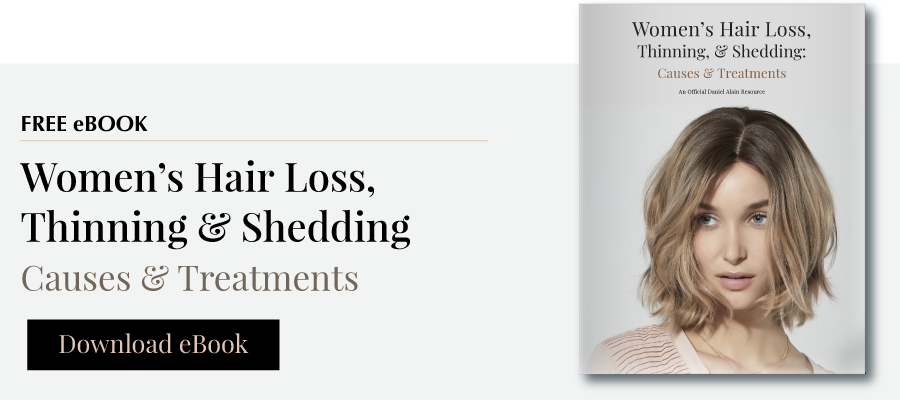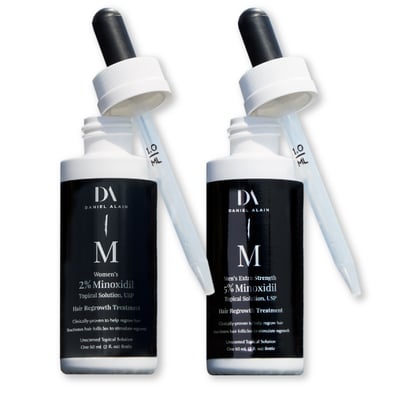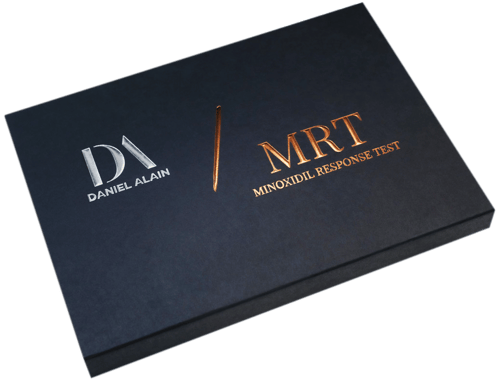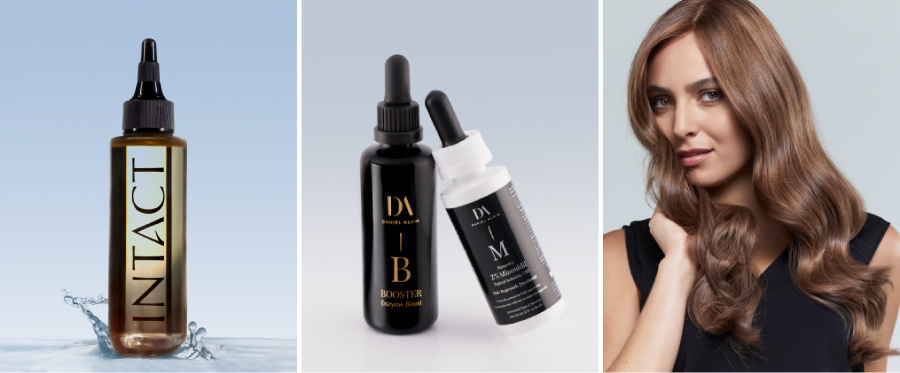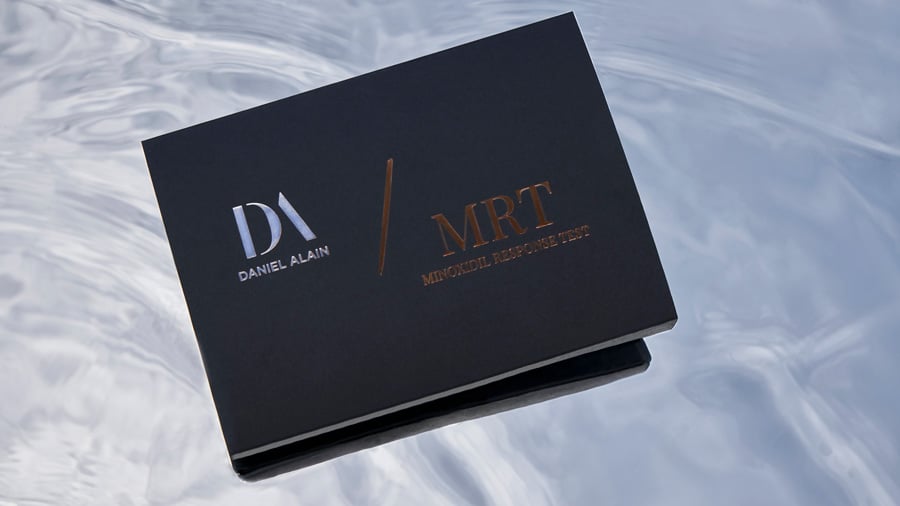The Best Vitamins for Hair Growth and Thickness
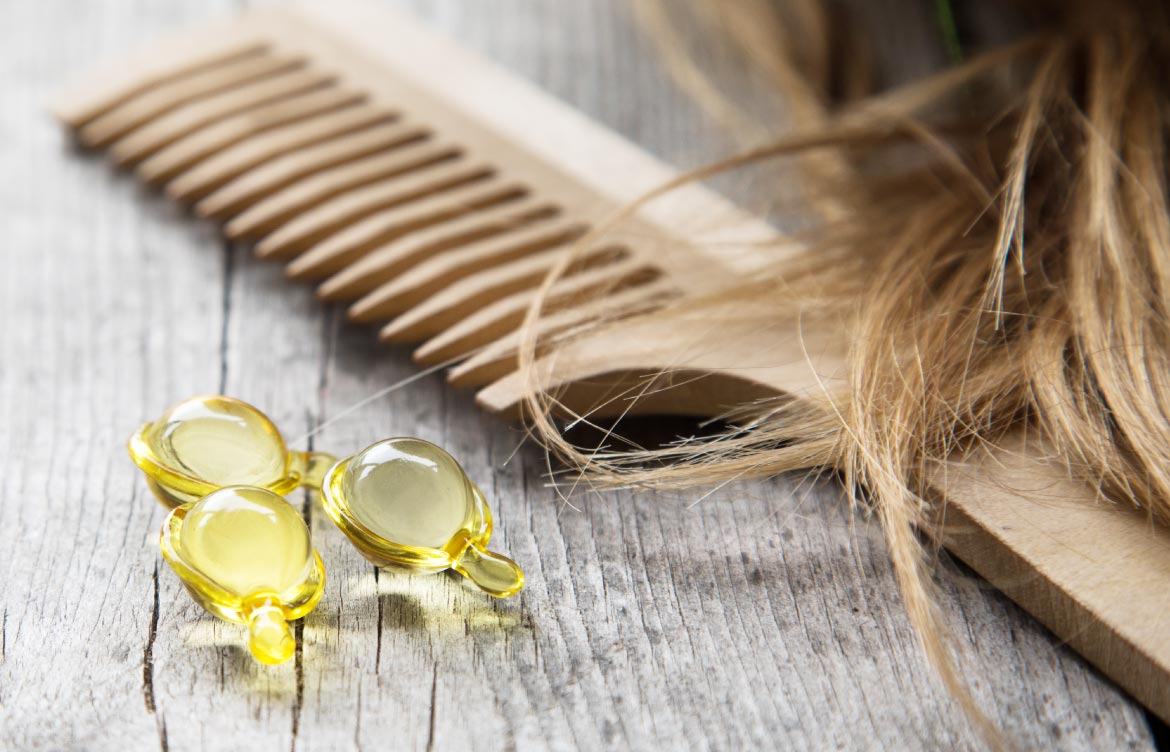
When your hair starts falling out, reaching for hair growth vitamins is the first step for many people. After all, physical health and hair growth go hand-in-hand. When our bodies are healthy, our follicles should grow healthy strands… right? On the flip side, a thinning mane that's stopped producing new strands is a sign that something's off internally.
We’ve all heard the basic recommendations for hair health: drink enough water, move your body, sleep at least seven hours a night, and eat a balanced diet. Not consuming enough of these nutrients can halt your scalp's hair growth cycle, while regularly eating the right mix can sometimes reverse hair loss and encourage growth.
Combining hair-friendly supplements with a healthy diet will surely offer some benefits, but if your genes are stacked against you or you're experiencing significant hair loss, you'll need more than vitamins for hair growth to get your mane back on track. In these cases, you'll likely need other interventions (like Minoxidil, Finasteride, or PRP therapy).
Though vitamins won't magically fix a bad diet or erase genetic hair loss, they can be a helpful supplement in your arsenal against hair loss.
In this comprehensive guide, we'll break down the best minerals and vitamins for hair growth. We’ll also provide additional resources for when vitamins just aren’t cutting it.
download our women's hair loss, thinning & Shedding causes & Treatments ebook
Which Vitamins are Good for Hair Growth?

While your body needs all the vitamins to truly thrive, there are a select few that have been scientifically proven to assist with certain types of hair loss.
But here's the kicker:
Hair loss vitamins will only have a noticeable effect if you're deficient in these minerals and vitamins.
When we're not getting vital nutrients—because of a poor diet, certain medical conditions, hormonal changes, or aging—our bodies go into survival mode and stop exerting energy towards non-essential functions like hair growth. In these cases, hair growth vitamins can supplement deficiencies and get your hair health back on track.
In the battle of hair thinning and hair loss, vitamins are an ideal and affordable solution. However, vitamins alone are not always enough to fully restore your mane. More often than not, heavy-duty ammunition is required like Minoxidil.
Before you begin taking the best vitamins for hair growth, schedule a blood test with your doctor to get your levels checked and see what you're missing.
So—what vitamins are good for hair loss? Let's dive in.
Vitamin A
Healthy cells are growing cells, and Vitamin A is all about promoting healthy cell turnover. By keeping your cells well-oxygenated and nourished, Vitamin A primes your hair follicles for rapid growth. And it gets bonus points for increasing sebum production, which keeps the scalp lubricated and nourished with natural oils, creating a moisture balm for your hair follicles.
B Vitamins
All of the B vitamins are known for their hair growth goodness. While the jury is still out on how effective these so-called holy grail vitamins for hair growth are on people without deficiencies, a few specific ones are definitely worth exploring.
Vitamin B7
You've likely heard of B7 by its other name: Biotin. This B vitamin is crucial for keratin production, a key protein in the growth and repair of hair, skin, and nails. However, there are conflicting reports on how helpful B7 is for promoting hair growth if you're not deficient.
Vitamin B12
One of the major vitamin deficiencies that have been linked with hair loss is a B12 deficiency. Given its crucial role in cell production, B12 is essential for stimulating healthy hair growth and keeping existing hair strong. Older adults and vegans are particularly prone to B12 deficiencies as there is no natural vegan source of B12 other than vitamins, so if you fit into one (or both) of those categories, it’s vital to add a supplement to your daily routine.
Vitamin C
As a potent antioxidant, Vitamin C helps your body create collagen, which creates keratin which creates healthy hair. It also helps to protect your strands from environmental stressors, like UV damage and pollution, by fighting off free radicals. So make sure you're munching on plenty of citrus fruits and peppers for your daily dose of Vitamin C.
Folic Acid
Pregnancy isn't the only time you need to be mindful of your folic acid intake. This B vitamin is responsible for growing all the cells in your body—including the ones on your scalp. So if your hair is thinning or looking a bit lackluster, it might be time to add some folate-rich foods (or supplements) to your diet.
Vitamin D
When it comes to stimulating both new and old hair follicles, Vitamin D is your best friend. Low vitamin D levels have been linked with hair loss, so if you're noticing thinning or patchy spots, it might be worth spending a little more time in the sun—and getting your vitamin D levels checked.
Vitamin E
No nutrient loves your hair more than vitamin E. Not only does it balance your scalp's oil production and improve its circulation (two key components for healthy hair growth), but it also restores your hair’s natural shine. Supplements and big servings of leafy greens can up your intake, but vitamin E oil applied directly to your hair shafts can supercharge results.
Iron
When your body lacks iron, hair loss is pretty much a given, as it means your follicles are not receiving enough oxygen. It's best to get your iron from food sources rather than supplements, but experts say that if you eat red meat less than two or three times a week, it might be worth supplementing with a low-dose iron pill.
Zinc
Another strong candidate for vitamin deficiency-related hair loss is zinc. This mineral helps your scalp hang onto strands a little longer by preventing your follicles from shrinking prematurely. Being a trace mineral, you can get your best sources from seafood and eggs, but a zinc supplement is also a safe option.
Omega 3s
Fatty acids are essential for your hair's health, and Omega 3s are some of the best sources out there. Being high in these fatty acids can help strengthen your strands, reduce inflammation and promote healthy cell turnover. Everything from walnuts to salmon can give you an Omega 3 boost, but if you're looking for convenience, there are plenty of supplements available.
How else you can control hair loss?
Taking vitamins for hair growth is an important part of maintaining hair health, especially if you're battling nutrient deficiencies. But taking even the most scientifically proven vitamins for hair loss can be slow and downright ineffective if there are other factors at play.
Genetics are responsible for an estimated 50 million men and 30 million women battling hair loss in the United States. In these cases, there aren't enough vitamin supplements in the world to stop their strands from falling out.
We know how distressing and demoralizing it feels to lose your hair. You don't want to waste months experimenting with supplements and diet changes only to find that you're still losing your locks. If you want to maximize your chances of regaining a full head of hair, you should pair vitamins for hair growth with hair shedding treatment.
Use INTACT Anti-Hair Shedding Treatment

When you're in the midst of an intense hair loss battle, every single strand counts. That's why Daniel Alain’s INTACT Anti-Hair Shedding Treatment is such an essential piece of your regrowth strategy. Its powerful PiliLock® Sevilla Orange Complex formula is clinically proven to stimulate the tiny muscles that surround each hair follicle so that they gently contract and keep your strands in place. This means that INTACT will prevent more hair loss and save your valuable strands from shedding.
Simply apply this pre-shower treatment a half hour before your wash, and you'll experience fewer strands falling out when you shampoo, brush, and style. INTACT is the best way to give your strands a fighting chance from succumbing to more hair loss.
See if Minoxidil Will Work to Regrow Your Hair

Rogaine® isn't just for your dad. Minoxidil is an FDA-approved topical solution for hair loss that is suitable for both men and women. It comes in a liquid or foam form that you apply directly to your scalp twice daily.
Minoxidil works by increasing blood flow and nutrients to the hair follicle, preventing hair loss, and encouraging new hair growth. While it's proven to be an effective treatment, researchers have recently learned that it only works if you have a specific enzyme present (known as SULT1A1).
Any amount of Googling will show you that Minoxidil is the best-known, science-backed hair regrowth treatment. But despite its reputation for being the best of the best, this extra-strength solution doesn't work for everyone. In fact, it's only effective in about 30-40% of women and 50% of men.
So—how can you find out if you're part of that lucky minority before you invest six to nine months into a costly regimen? You take Daniel Alain's Minoxidil Response Test.
After decades of research, Daniel Alain’s Research and Development team identified that for Minoxidil to be effective, a person needs certain levels of SULT1A1 enzyme activity to convert Minoxidil into its active form. Without this enzyme activity, this topical treatment won't work. So we developed a simple test that uses your hair strands to determine if your scalp produces enough SULT1A1 enzyme activity to respond to Minoxidil. That way, you can avoid months of frustration and money wasted on a product that won't work for you.
Wear a Human Hair Wig or Topper

For women battling hair loss, you don't have to lose your sense of style—or self—along with your hair. Wigs are a great way to instantly transform your look and mask any balding patches while you're working to regrow your own locks.
But with so many options, it can be hard to figure out what kind of wig best suits you. While synthetic wigs are an affordable choice, they don’t have the natural movement seen in high-quality human hair wigs and toppers.
Why? First, you get the best of both worlds—a natural look and a longer lifespan than synthetic wigs. You also get the freedom to style your wig as you please, as human hair wigs can be washed, blow-dried, curled, and straightened just like your own hair. Finally, look for human hair wigs made with premium European hair, as seen in our Follea hair pieces. These pieces feature ethically sourced hair that’s hand-tied to a breathable lace-front cap for maximum comfort and movement. .
If hair loss has kept you hidden from the world, investing in a high-quality human hair wig can help you step out confidently and resume the activities you love to do. Investing in a high-quality wig or topper will help you maintain your style and confidence while you pursue a hair regrowth strategy.
STOP HAIR LOSS IN ITS TRACKS WITH DANIEL ALAIN
Hair loss is a scary and stressful experience, but you don’t have to go through it alone. Daniel Alain is here to help you tackle hair loss in a safe, effective way.
With the best of both worlds—science-backed anti-shedding and regrowth treatments like INTACT and Minoxidil, plus premium human hair wigs and toppers that help you look your best while you’re waiting for regrowth—we’ve got you covered no matter where you are in your hair loss journey.
So if you're stuck and wondering what to do next, here's what we recommend:
- Get a blood test from your doctor and determine if you have any nutrient deficiencies. If you do, start taking necessary hair loss vitamins or shifting your diet to incorporate more of what your body needs.
- Look at your family history for any signs of androgenic alopecia (the medical term for genetic hair loss). For men, it'll look like a receding hairline or a bald spot on the crown. For women, it often looks like thinning at the part or diffuse thinning all over.
- Grab a bottle of our INTACT Anti-Shedding Hair Treatment to help you retain your existing strands.
- Take our Minoxidil Response Test to determine whether or not this treatment will work for you. If your response is negative, move forward with our Non-Responder Treatment Plan for Men or Women, which combines Minoxidil with our Enzyme Booster to increase your chances of success with Minoxidil.
- And finally, if you want to instantly transform your appearance and confidence, invest in a high-quality human hair wig or topper. Regrowing hair is a lengthy process, and you deserve to feel your best the entire time.
At Daniel Alain, we understand that hair loss can be an emotional and difficult battle to fight. That's why our goal is to provide you with the best and most effective solutions for your hair loss journey. So don't hesitate to reach out if you need advice or have any questions—we're here to help.
Visit our website or schedule a free consultation today to learn more about how we can help.
book a free consultation
Our stylists will help you find the right hair thinning solution just for you.

Frequently Asked Questions
Can Vitamins Fix Hair Loss?
Yes—but only if your hair loss is caused by a nutritional deficiency. Deficiencies in iron, zinc, magnesium and certain B vitamins like biotin can lead to hair loss. If you think this may be the case for you, ask your doctor for a blood test. Just remember that other factors, like genetics, are more common causes of hair loss and require more powerful solutions like Minoxidil to treat.
Can Vitamins Worsen Hair Loss?
Yes—in some cases. Over-supplementing with hair loss vitamins can cause an overload of certain minerals in the body, which can trigger hair loss as a side effect. Vitamin A and E are especially prone to causing hair loss if taken in excess. So be sure to take only the recommended dose of any vitamins you’re taking, and always talk to your doctor before starting a new supplement.
Can Vitamins Prevent Hair Loss?
Not entirely—but they can help. Your body will stop producing new hair if it's not getting enough of the right vitamins and minerals. A healthy, balanced diet and supplementing with vitamins you know you're deficient in (via blood test) can help support your body's natural hair growth process. But if you're experiencing genetic or pattern hair loss, you'll likely need a stronger solution like Minoxidil or Finasteride.
What Supplements are Good for Hair Growth?
The best vitamins for hair growth are the vitamins you're proven to be deficient in. That being said, vitamin A, vitamin B7, vitamin b12, vitamin C, vitamin D, vitamin E, iron, zinc, omega 3s, and folic acid are all beneficial for promoting healthy hair growth. Talk to your doctor and get a blood test to find out if you're deficient in any of these nutrients.
How Do I Choose Vitamins for My Hair?
The best way to choose vitamins for your hair is to identify the cause of your hair loss and then find the best supplements that will address it. If, for instance, you're experiencing hair loss due to a nutritional deficiency, then find vitamins that will help replenish the nutrients your body is missing. But if you're experiencing genetic or pattern hair loss, then other, stronger treatments like Minoxidil or Finasteride may be best.
Start by taking both a blood test and a Minoxidil Response Test. These tests will help you identify the best course of action and ensure that you're on track to restoring your hair.
What Vitamins am I Lacking if My Hair is Falling?
There are many different vitamin and mineral deficiencies that can contribute to hair loss. Some of the most common are iron, zinc, magnesium, and certain B vitamins like biotin. A blood test from your doctor is the best way to determine which nutrients you're missing. Once you know, you can supplement accordingly and get back on the road to healthy hair growth.
How Many Vitamins Should I Take Per Day for Hair Loss?
The best way to determine the right hair loss vitamins to take is to talk to your doctor and get a blood test. This will help identify any nutrient deficiencies that may be causing your hair loss. Once you know, you can start supplementing with the best vitamins—and the best dosage—for your individual needs.
Is it OK to Take Different Kinds of Vitamins Together?
In most cases, yes—but always talk to your doctor before starting a new regimen. Some vitamins and minerals can interact with each other or with another medication you're taking, so it's best to be aware of the potential side effects before starting a new supplement.
Can Vitamins Thicken My Hair?
Hair loss vitamins aren't miracle pills. They simply support your body's natural hair growth process by providing essential nutrients that you're not getting in your diet. That being said, they can help stimulate hair growth and thicken your existing strands. But if you're experiencing genetic or pattern hair loss, then other treatments like Minoxidil or Finasteride may be more effective.
Which Foods Help Prevent Hair Loss?
Eating a diet rich in lean proteins, leafy green vegetables, and healthy fats can help nourish your hair and keep it growing strong. Some of the best foods for preventing hair loss include salmon, nuts, eggs, avocado, spinach, carrots, and sweet potatoes. But a plate full of veggies isn't always enough to keep your receding hairline at bay. Sometimes other factors like genetics, stress, or certain medications can cause hair loss.
If you suspect hair loss could be in your family history, take Daniel Alain's Minoxidil Response Test. Within 14 days, you'll know if you have the right amount of Minoxidil in your body to stop hair loss or not. Armed with this knowledge, you can make the best decisions for your hair growth journey.
Does INTACT Really Work for the Hair Shedding?
Yes—in a clinical study, INTACT "reduced the number of hairs shed during brushing by up to 77%." High-shed activities are a part of many grooming routines. Brushing, washing, and styling your hair can cause a huge amount of shedding. INTACT helps protect against this by stimulating the tiny muscles at the base of each hair follicle so that your strands are more resilient and resistant to the breakage that comes from daily styling.
Adding INTACT to your regime is a great way to hold on to the hair you have while you find a hair loss solution that works for you. Click here to grab your first bottle today!
Is INTACT Safe to Use on My Hair?
Yes—INTACT is free of sulfates, parabens, silicones, oils, SD alcohol, artificial dyes, and gluten. Plus, it's vegan-friendly and color-safe. So you can use it with confidence, knowing that it's gentle on all hair types. Click here to grab a bottle today!
How Do I Properly Apply INTACT?
Using INTACT is easy. Simply apply the pre-shampoo treatment to your dry hair in sections, fully saturating your scalp. Massage it in for two to three minutes, and then let it sit for 30 minutes. Once a half-hour is up, you can hop in the shower and shampoo as usual.
Should I Use INTACT Every Day?
INTACT works better the more you use it. While you don't have to use it every single day to see results, you should use it as often as you shampoo your hair, as the act of shampooing can cause hair shedding.
Can INTACT Regrow My Hair?
No—INTACT is not a hair regrowth product. It's best used as a pre-shampoo treatment to help protect against the hair shedding caused by daily styling and grooming. INTACT can help you hold on to the hair you have while you find a hair loss solution that works best for your individual needs.
What Happens If I Wash INTACT Out of My Hair in Less Than 30 Minutes?
We know that you're busy, but if you don't give INTACT the full 30 minutes it needs to work its magic, then it won't be as effective. Try to think of it as an investment in your hair. The time you spend using INTACT will pay off in the long run with stronger and healthier strands.
Does Minoxidil Really Work to Regrow Hair?
Yes—but only for a small percentage of the population. Minoxidil is reportedly only effective in 30-40% of women and 50% of men. Why? Because scalps need to have a certain amount of SULT1A1 enzyme activity in order to convert Minoxidil into its active form. And everyone's scalp is different, so the effectiveness of Minoxidil can vary widely.
That's why taking Daniel Alain's Minoxidil Response Test is so crucial. In just two weeks, you’ll know if your scalp has the right enzyme activity for Minoxidil to work—allowing you to make an informed decision about your next steps. If you have enough, great! You can keep on your Minoxidil regimen.
Why Doesn't Minoxidil Work for Everyone?
As it turns out, Minoxidil isn't the end-all, be-all it claims to be. Minoxidil only works if your scalp has enough SULT1A1 enzyme activity to convert it into its active form. If you don't have enough, you likely won't see any new growth.
Taking Daniel Alain's Minoxidil Response Test is a great way to find out if your scalp has enough of the enzyme to make Minoxidil work.
How Does Minoxidil Testing Work?
Figuring out whether or not Minoxidil will work for you has never been easier. Simply order your Minoxidil Response Test from Daniel Alain, and you'll receive a kit with everything you need to take the test. Then all you have to do is send in a small hair sample and wait for the results, which will be delivered via email within 14 days. Click here to grab your test today!
Is the Daniel Alain MRT Kit Effective?
Yes—Daniel Alain's Minoxidil Response Test is 95.9% accurate in determining whether or not Minoxidil will work for you. It uses the best available science and technology to assess your scalp's SULT1A1 enzyme activity, giving you the best chance at seeing real results from your Minoxidil treatments.
If I have a Negative Result from the MRT Kit, What Does it Mean?
If your MRT result comes back negative, it means you have a low level of SULT1A1 enzyme activity in your scalp.


